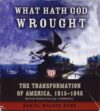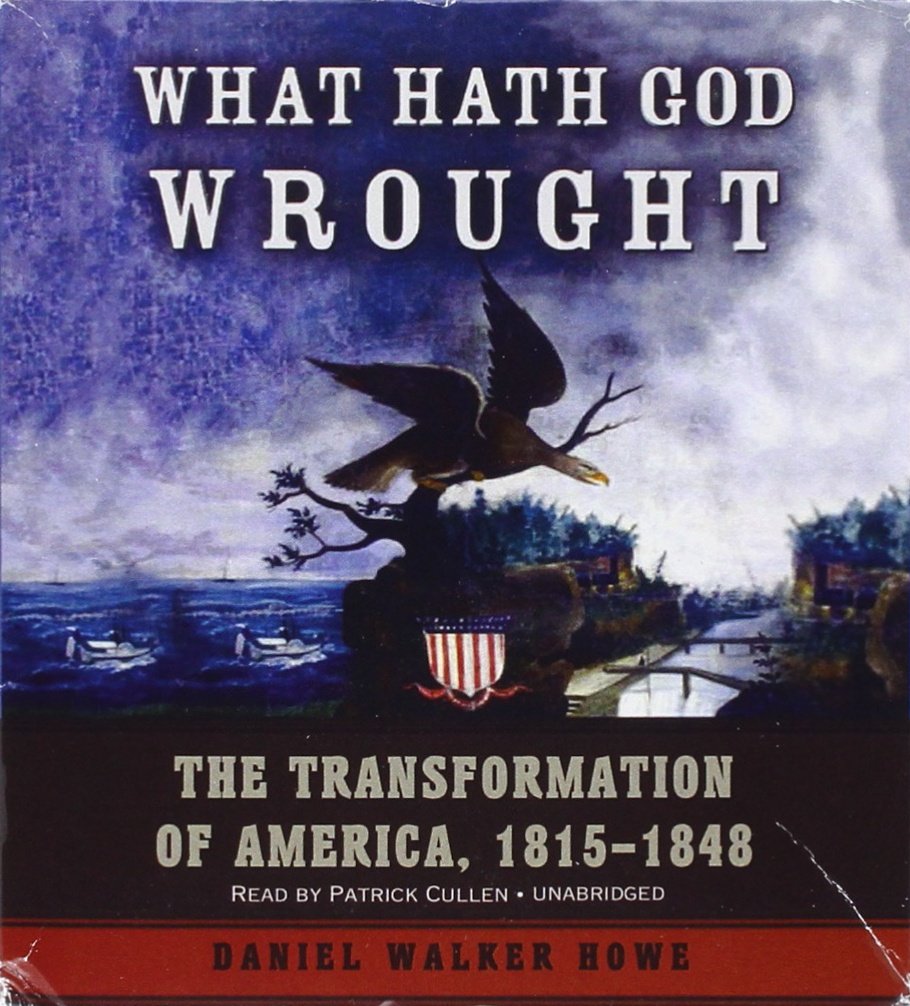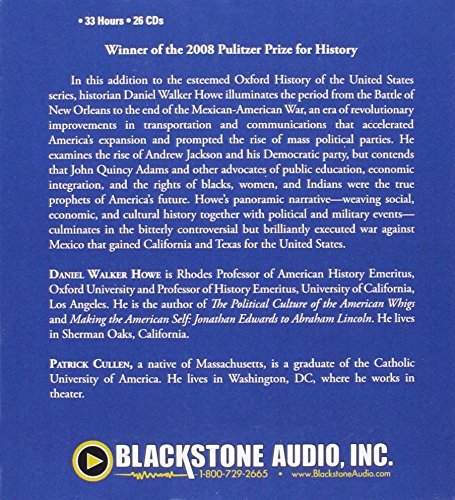
Original price was: $49.95.$32.46Current price is: $32.46.
What Hath God Wrought: The Transformation of America, 1815-1848 by Daniel Walker Howe Price comparison
What Hath God Wrought: The Transformation of America, 1815-1848 by Daniel Walker Howe Price History
What Hath God Wrought: The Transformation of America, 1815-1848 by Daniel Walker Howe Description
What Hath God Wrought: The Transformation of America, 1815-1848 by Daniel Walker Howe
Discover the captivating narrative of What Hath God Wrought, a comprehensive exploration of America’s transformation between 1815 and 1848. Written by acclaimed historian Daniel Walker Howe, this unabridged audiobook edition published by Blackstone Audiobooks invites listeners to dive into a crucial period of American history where innovation, conflict, and change were at the forefront. Whether you’re a history buff or just curious about this vibrant epoch, this audiobook will deepen your understanding of America’s past.
Key Features & Benefits of What Hath God Wrought
- Unabridged Audio Format: Enjoy the full depth of Howe’s narrative, capturing every intricate detail and historical insight. Ideal for those who prefer immersive listening experiences.
- Expertly Crafted Narrative: Howe presents history in an accessible way, combining rigorous scholarship with engaging storytelling. A perfect blend for both scholars and casual listeners.
- Publisher Information: Released by Blackstone Audiobooks, this edition upholds a high standard of quality and clarity, crucial for an enjoyable listening experience.
- Dimensions: Compact size (5.3 x 2 x 5.8 inches) makes it easy to handle, ensuring that you can enjoy it at home or on the go.
- Item Weight: At just 1.1 pounds, this audiobook is lightweight, allowing for easy transport for listeners who want to absorb history during their commutes.
- ISBN Information: ISBN-10: 1433260212; ISBN-13: 978-1433260216—ensures easy identification and ordering.
Pricing Comparison Across Suppliers
Finding the best price for What Hath God Wrought has never been easier. Across major suppliers, prices can vary, giving you the opportunity to choose the option that best suits your budget. Currently, you can expect to find prices ranging from $25.99 to $34.99, depending on the retailer. Use our price comparison feature to explore options and save on your purchase.
Trends from the 6-Month Price History
Analyzing the 6-month price history reveals interesting trends. Initially priced at around $29.99, the cost experienced slight fluctuations due to seasonal demand. Recently, we have observed a decrease in overall prices, making it a fantastic time to buy. Stay informed about the best times to purchase this title for maximum savings.
Customer Reviews Summary
Audiences have responded positively to What Hath God Wrought, highlighting its engaging narrative style and comprehensive coverage of an important era in American history. Many listeners appreciate Howe’s ability to weave complex themes of politics, society, and culture into a coherent story. Common praises include the enriching content that both educates and entertains.
However, some users noted that the depth and detail may make it less suitable for those seeking a lighter overview of the period. A few reviews mentioned that certain segments may feel dense, possibly requiring listeners to pay extra attention to fully appreciate the content. Still, the majority of feedback emphasizes the audiobook’s value for those genuinely interested in learning more about America’s past.
Explore Unboxing & Review Videos
Interested in what listeners think? Check out various YouTube review and unboxing videos available online. These resources provide insightful previews of the audiobook’s content and valuable opinions from other listeners. Engaging with these videos can deepen your understanding of what to expect and enhance your overall experience.
Why You Should Dive Into What Hath God Wrought
This audiobook is not just a retelling of historical facts but a significant analysis of the development of American identity. Daniel Walker Howe’s scholarly approach offers unparalleled insights into the events that shaped modern America. Each chapter unfolds a new revelation about politics, religion, and the social movements that interwove during this transformative period.
If you’re keen on understanding the complex tapestry of American history, listening to What Hath God Wrought: The Transformation of America, 1815-1848 is a must. With its higher reception among listeners and solid grounding in historical fact, this audiobook stands as a prominent resource for both passionate learners and casual listeners alike.
Ready to uncover the rich history of America? Don’t hesitate—compare prices now and choose your best option to start enjoying this captivating audiobook!
What Hath God Wrought: The Transformation of America, 1815-1848 by Daniel Walker Howe Specification
Specification: What Hath God Wrought: The Transformation of America, 1815-1848 by Daniel Walker Howe
|
What Hath God Wrought: The Transformation of America, 1815-1848 by Daniel Walker Howe Reviews (7)
7 reviews for What Hath God Wrought: The Transformation of America, 1815-1848 by Daniel Walker Howe
Only logged in customers who have purchased this product may leave a review.









Marc Ranger –
What hath God wrought is an extensive historical analysis of the United States between the War of 1812 and the Mexican War.
On the positive side, the political evolution and the choices that the American public faced during those years are made quite clear. America’s white males had to choose between Democratic backwardness championned by the likes of Andrew Jackson and the progressive views of Henry Clay and John Quicy Adams.
The slaveowning South, who had the indecency to treat blacks like chattel, was able to count as a 3/5 citizen every slave (who coudn’t vote, of course), thus controling the electoral college, House of Representatives and Executive. In essence, the slaveholding South held the reins and was able to reject any attempt at progress held dear by the industrial North.
That is quite clear reading the book. However, many pages are devoted to the Millenium, or, if you will, the Second Coming of Christ. It’s hard to phantom that the Millenium had so much of an influence on daily politics and life. In any case, too much space is devoted to it.
I’d give the book a five 5 if it wasn’t for the impressive amount of ink spent on it.
Cliente Amazon –
O livro aborda uma era da história americana como nenhuma outra, talvez. É abordado como o país estava se descobrindo enquanto democracia e como entrou de um jeito e saiu de outro. Locomotivas, telégrafo, expansões territoriais, imigração em massa, feminismo etc são alguns dos pontos abordados. Leitura fantástica! Recomendo!
James Barton Phelps –
Daniel Walker Howe is Rhodes Professor of History at Oxford (Emeritus) and Emeritus Professor of History at the University of California and in this book he has provided us with a sensible, thorough, wise, balanced and thoughtful history of America from 1815 through 1848. It richly deserves the Pulitzer Prize in History which it won in 2007 and represents history as I like to see it written.
It’s long – 855 pages – and I thought it spent a bit too much print on the politics of the time; but there was much to cover and Professor How did a magnificent job.
Writing a “review” of a book like this isn’t easy. One can’t go over the history again. About all one can do is tell you what it covers and then urge you to read it for yourself. Fact of the matter is that I had never known the history of the period covered by the book and I came away impressed with what was accomplished and what changed in the United States in the 33 years between the Battle of New Orleans January 1, 1815 and the discovery of gold in California and the Treaty of Guadalupe Hidalgo in 1848.
On the positive side there was the tremendous growth of the market economy, the territorial expansion of the country to include the “West” as it is today – all the way to the Pacific – including Texas, all of Mexican Alta California (including what is now Arizona, New Mexico, Nevada and Utah as well as California) and the Oregon Territory (Now Oregon and Washington)) and the awakening of the Protestant churches whose moralistic vigor gave us opposition to slavery, educational institutions (mainly colleges and universities) and the beginnings of the women’s movement with the Seneca Convention of 1848. Of doubtful benefit but listed as advantage rather than disadvantage was the establishment of mass political parties, particularly encouraged by Andrew Jackson who has earned my nomination for the title of greatest political villain of the time.
There were the negatives too – poverty, demagoguery, disregard for legal restraints (Indian Removal), the perpetuation and expansion of slavery and the waging of aggressive war against Mexico.
Population increased from 8,3 million in 1815 to 22 million in 1848 with a huge influx of immigrants from Germany and particularly Ireland.
The growth of the press, the establishment of the canal system (Erie Canal completed in 1825), the construction of roads (the National Road completed from Baltimore through the Cumberland Gap to Vandalia Illinois in 1834), the start of a network of railroads (started in 1834 there were 7,500 miles of track by 1848) and most importantly the invention of the telegraph in 1844 and its instant popularity provided a communication and transportation revolution which tied the country together in terms of distance and speed as nothing has done until the technological revolution of the twentieth century.
Politically the Virginians (Washington, Jefferson, Madison, Monroe) and the Massachusetts Adams (John and John Quincy) who governed during an Era of Good Feeling gave way to rabble (Andrew Jackson) that not only instituted partisan political warfare between parties but also enlarged the suffrage to include non-property owners – but no slaves and no women voted. Jackson founded what is now the Democratic Party. The party of John Quincy was the Whigs who eventually (Abraham Lincoln) morphed into the Republican Party.
Constitutionally the President (Jackson) emerged with more power, the states with less (Dartmouth College Case -nullification defeat of south Carolina claim that State had right to overrule Federal legislation)
And finally the insidious problem of slavery slowly grew to permeate all political consideration, all social action and most all discussion. It was a moral, economic and political problem, which would bring us to Civil war 12 years after the end of the period covered by this excellent book.
Presidents of the period covered by the book:
James Madison – 1812
James Monroe – 1816
John Quincy Adams – 1824 (most intelligent by far)
Andrew Jackson – 1826
Andrew Jackson – 1830
Martin Van Buren – 1836
William H. Harrison – 1840 – died one month in office – succeeded by Martin Van Buren to end of term
James K Polk – 1844
Zachary Taylor – 1848.
JBP 9/1/09
Gabriel Stein –
History is over the United States frequently tend to rush through the period between the War of 1812 and the Civil War. This is perhaps not surprising, but as this excellent book shows, the period 1815 to 1848 it’s fascinating in itself. In addition, it provides a vital background to the conflagration that eventually erupted in 1861.
Monsieur Storch –
Historische Werke zur Geschichte der USA sind zwar auch in Deutschland nicht gerade rar gesät. Nichtsdestotrotz erscheint hierzulande natürlich nur ein Bruchteil der Publikationen, die in den USA selbst verlegt werden. „What Hath God Wrought“ von Daniel Walker Howe ist hier ein gutes Beispiel. Der Band behandelt eine vergleichsweise frühe Periode der US-Geschichte: die Zeit zwischen 1815 und 1848. Zeitlich liegt sie zwischen zwei Kriegen: dem gegen England (1812-1815) und dem gegen Mexiko (1846-1848). In dieser Zeit, so erfahren wir in „What Hath God Wrought“, vollzogen sich eine Reihe wegweisender Entwicklungen: die entgültige Erschließung des Gebietes östlich des Mississippi, das Vordringen in die Gebiete jenseits davon, die Entwicklung infrastruktureller Projekte wie dem Erie Canal, und auch die Antebellum-Gesellschaft des auf dem Sklaverei-System basierenden Südens nahm erst in jener Periode seine endgültige Gestalt an. Im Zentrum der Abhandlung steht die umstrittene Präsidentschaft von Andrew Jackson sowie die Ausprägung jenes Parteiensystems, das bis heute in seinen Grundzügen Bestand hat.
Wie die meisten angelsächsischen Historiker versteht es auch Howe, seinen Stoff anschaulich zu vermitteln. Trotzdem wird das Buch vor allem für US-Experten von Interesse sein. Die Reihe Oxford History of the United States, in der auch Howes Werk erschienen ist, wartet derzeit mit knapp einem Dutzend Publikationen zu Einzelabschnitten der amerikanischen Geschichte auf; weitere Publikationen sind geplant. Mit ihren Einzelabhandlungen dürfte die Reihe das derzeit ambitionierteste Projekt zur US-amerikanischen Geschichts-Gesamtdarstellung sein. Deutschen Lesern ist Kenntnis der englischen Sprache abverlangt. Belohnt wird man durch eine Darstellung, die eben so leider nicht in deutscher Sprache zur Verfügung steht.
Es sei denn, ein Verlag hierzulande entschließt sich, Howes Buch sowie andere aus der Reihe für den deutschen Markt zu adaptieren.
Ferguson Family –
Daniel Howe’s Pulitzer-Prize-winning history of antebellum America (pre-Civil War) is a massive read (850 pages) which took me three months of periodic reading to complete. I started off strong, pushing through 300 pages in a couple weeks, but then took time off as my interests turned to other books. However, each time I came back, I immediately jumped back in to the story line and got lost in the history.
Howe’s work is so helpful and impressive for three different reasons.
First, this work is one of the best researched history books I have ever read available for a popular audience. Each page is meticulously footnoted to show Howe’s sources, and the book ends (after 850 pages) with another 50 page bibliographical essay where he interacts with sources at a critical level. This may be one reason that this book took me so long to read – every page has three or four footnotes with insight from Howe into their usefulness in studying that topic. In topics that especially interested me, I found myself looking through Amazon for his footnoted resources. The span of this book is massive (covering 1815 to 1848), and the amount of research available on this period is overwhelming. If you want to get your arms around this little-known period of American history, start with Howe’s book.
Second, and seemingly contradictory to my first point, Howe’s book is extremely readable. I have read many history books over the years and while some have mastered the facts of their era, they have obviously not mastered the English language. Howe’s book is unique in his ability to not only master the relevant information (see point 1), but his ability to make the history come alive on paper. I appreciated that Howe’s was not uncritical in his approach to the period, giving his opinions along the way. I know that historians are supposed to just give the facts and not share their personal views, but in reality this is impossible to do and makes history extremely boring to read. Howe walks the line well between telling the story and analyzing the story. With so much up-heaval during this period, he has plenty of material to work with.
Finally, I appreciated Howe’s work because of the significant space he committed to discuss the impact of and changes in the religious fabric of American life. I have rarely interacted with a scholar of Howe’s pedigree who is so conversant in religious history. He gives several chapters to looking at the impact of the Second Great Awakening (occurred during these years) and the impact of religious creativity (Mormonism and other sects were born during these years) on American culture. It would have been easy to write about this period simply from a political perspective, covering the great expansion of the United States, the interesting presidential elections, and American involvement in war. Instead, Howe gives us the street-level view of life and especially of religious life.
In closing, please note that this book is one volume in a series of American history books called The Oxford History of the United States, where each volume is written by a different author. The only other work in the series that I have read is James McPherson’s Battle Cry of Freedom, the history of the Civil-War (the book picks up right after Howe’s ends). McPherson’s work is also amazing in it scope, though the number of years it covers is less because the details of the Civil War take up so much space.
D_S –
Great, comprehensive look at American society and politics in the Antebellum era. The importance of religion was especially striking. Even atheists and agnostics should recognise the valuable role it played in history, because Howe shows that American Protestantism inspired more progressive movements than anything else in the country. JQ Adams, Charles Finney, Elizabeth Cady Stanton, and others all shine as American luminaries.
The Jacksonian Democrats can more easily be painted as villains due to their hardline anti-Native and pro-slavery policies, which Howe documents extensively. But even they enshrined principles that are now taken seen as cornerstones of American culture- acceptance of immigrants, support for democracy abroad, supporting the rugged individual over an elite. Despite being less in favour of internal improvements and infrastructure than the Federalists + Whigs, the Democrats also supported the concept of modernisation.